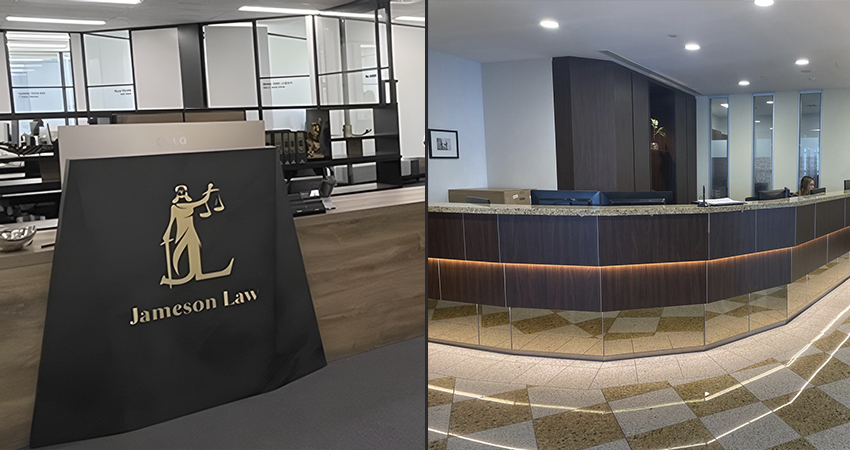MEDIATION
WE GET IT
WE'RE IN IT TO WIN IT
Book your consultation
- This form submission is encrypted and secured to ensure your information remains confidential.
This form submission is encrypted and secured to ensure your information remains confidential.
Mediation can be a cost-effective way to come to an agreement.
Award-Winning Compensation Law Firm
We have won several awards including APAC’s coveted Best Personal Injury Law Firm Australia 2025.
Proven Track Record
50+ Years of Combined Experience litigating Personal Injury Cases means a successful outcome is on the table.
5 Star Reviews Everywhere
We’re in it to win it and we fight hard for our clients. That’s why anywhere you look you will find 5 star reviews.
No Win No Fee Guarantee
Our No Win No Fee guarantee includes all disbursements. Your payout will always significantly outweigh our legal fees.
Award-Winning Compensation Law Firm
We have won several awards including APAC’s coveted Best Personal Injury Law Firm Australia 2025.
Proven Track Record
50+ Years of Combined Experience litigating Personal Injury Cases means a successful outcome is on the table.
5 Star Reviews Everywhere
We’re in it to win it and we fight hard for our clients. That’s why anywhere you look you will find 5 star reviews.
No Win No Fee Guarantee
Our No Win No Fee guarantee includes all disbursements. Your payout will always significantly outweigh our legal fees.
Family relationship breakdowns can be highly emotional. Most of the time, separating couples find it difficult to agree on property settlement and parenting arrangements. While there is a Family Law system in place to help, it is highly recommended that where possible, you and your former partner should engage in family dispute resolution (FDR) before obtaining the assistance of the Court for your family law issues. The Court may make an exception in an emergency, for example, where a parent has refused to return a child after visitation or is attempting to leave the country with the child.
If you are in the process of separating, contact our team of friendly family lawyers for a free and confidential initial consultation.


What is mediation?
Mediation is a structured negotiation process in which a neutral third party, known as a mediator, assists the parties to a dispute to identify and assess options and negotiate an agreement to resolve their dispute. It is one of many alternative dispute resolution methods.
Unlike a court hearing, mediation is a quick and cost-effective method of resolving your family law matter. It allows you to voice your point of view and come to an arrangement that best suits both parties. Mediation can take place over several hours or days depending on the complexity of the matter and the willingness of the parties to engage in the process.
In Australia, the Family Law Act 1975 (Cth) requires parties to Family Law proceedings to make a reasonable attempt to mediate their family law dispute before applying to the Family Court for court orders. It is irrelevant if you were married or in a de facto relationship, you MUST attempt mediation. If you fail to complete mediation before applying to the Court, the Court has the discretion to refer you to mediation before it will hear your matter.
If family law mediation is unable to be completed, a mediator can issue you with a section 60I certificate. Mediation may not be able to be completed for the following reasons:
![]() One of the parties didn’t attend
One of the parties didn’t attend
![]() You both attended and made a genuine effort to resolve the dispute but couldn’t reach an agreement
You both attended and made a genuine effort to resolve the dispute but couldn’t reach an agreement
![]() You both attended but one of you did not make a genuine effort to reach an agreement
You both attended but one of you did not make a genuine effort to reach an agreement
![]() The mediator did not believe it was appropriate to conduct mediation
The mediator did not believe it was appropriate to conduct mediation
![]() During the mediation process, the mediator determined it was no longer appropriate to continue mediation.
During the mediation process, the mediator determined it was no longer appropriate to continue mediation.
The results of mediation are not legally binding or enforceable, however, they can be formalised by making an application to the Court. If you require assistance to start the mediation process or formalising your agreement, contact our office for a free initial consultation.
Types of mediation
There are a number of ways mediation can be conducted:
![]() Standard mediation
Standard mediation
Mediation usually takes place between you and your former partner with the guidance of the mediator. It is an informal process where you can identify your issues and work together to resolve them in a mutually beneficial way.
 Legally assisted mediation (LAM)
Legally assisted mediation (LAM)
Mediation doesn’t usually involve lawyers being present. However, there are times when it may be appropriate for both parties to have their lawyer present during the mediation process. For example, where there is high conflict between the parties or complex issues need to be resolved. It is up to the mediator to decide whether legally assisted mediation is required.
 Shuttle mediation
Shuttle mediation
Mediation usually takes place face to face, however, there may be times where shuttle mediation is more appropriate. Shuttle mediation occurs when it is inappropriate for you to be in the same room as the other person. You will be in a separate room and the mediator will move between the rooms to conduct the mediation.
Case Study
Piotr and Sam separated after 10 years. They have two children aged eight and 10. They couldn’t agree on parenting arrangements or the division of property. Sam sought legal advice and initiated mediation. She disclosed that she was the victim of financial abuse and Piotr could be controlling.
The mediator conducted an assessment of the matter and decided that legally assisted mediation was the best course of action. The mediation took place over a couple of days and it became clear that they wouldn’t find a solution through mediation. The mediator issued a section 60I certificate and Sam began the court process to have the matter finalised.
Family Law Mediation process
Initial Consultation
Contact Jameson Law for legal advice before initiating mediation
Compile Required Documents
Make sure you have all the necessary documents required for mediation e.g. copies of AVOs, financial documents (for property settlement), copies of your children’s schedules (for partnering matters, etc
Contact a Family Dispute Resolution Service
Contact a Family Dispute Resolution service to apply for mediation
Other party is put on notice
The Family Dispute Resolution Practitioner (mediator) will notify the other party that you have requested mediation. The other party can consent to mediation or refuse to participate. If they consent, the mediator will notify you of the date. If they refuse, the mediator can issue a section 60I certificate for you to produce to the court if you apply for court orders.
Assessment is conducted
The mediator will conduct an assessment of the matter to determine if mediation is appropriate or if alternative arrangements such as legally aided mediation should take place. The assessment considers family violence, power imbalance, risks to children, psychological health of the parties and anything else they consider appropriate.
Mediation Commences
During the session/s, the mediator assists the parties to identify issues to be resolved and encourage each party to express and listen to ideas. The mediator ensures everyone is kept on track and has an opportunity to identify their issues and possible solutions
Financial Agreement Drafted
If you reach an agreement, the mediator can assist you to draft your financial agreement for your property matter or a parenting agreement for your parenting matter
Formalise Agreements
If you need to formalise your financial agreement or parenting plan, you can apply to the Court for Consent Orders. Formalising your agreement or plan will result in it being legally binding and enforceable
If Mediation Fails, section 60I certificate
If you do not reach an agreement, the mediator will issue a section 60I certificate. This certificate can be presented to the Court as evidence of your attempt to complete mediation
Court Process Commences
After making an application to the court, you can begin the court process to have your matter resolved. A decision by the court is legally binding and enforceable.
Case Study
Michelle and Andre have two children aged three and five. They couldn’t agree on their parenting arrangements and both sought legal advice. They attended their local family dispute resolution service and participated in standard mediation. After a few hours, they were able to come to an agreement that suited both of them.
Due to the age of their children, they decided not to formalise their agreement with Consent Orders. The children are still young and they need to be flexible with their arrangements to accommodate their children’s growing social and educational development.
Disclaimer
Disclaimer
The above is general legal information and should not be considered legal advice. You should speak with one of our family lawyers for legal advice tailored to your specific legal matter. The courts deal with matters on a case by case basis. It should also be noted that there may be court delays due to COVID-19.
Speak to an Expert Lawyer today

WE'RE IN IT TO WIN IT
Book your consultation
- This form submission is encrypted and secured to ensure your information remains confidential.
This form submission is encrypted and secured to ensure your information remains confidential.
What our Clients Say
Trustindex verifies that the original source of the review is Google. Worked with Nora and Cooper both really supportive and great help with my traffic matter highly recommendTrustindex verifies that the original source of the review is Google. I had the pleasure of being represented by Nora Sayeed from Jameson Law, and I couldn’t be more grateful for her support and professionalism throughout my legal matter. From our very first interaction, Nora was attentive, understanding, and thorough in her approach. She took the time to carefully listen to my situation, explained every step clearly, and made sure I felt supported at every stage. What stood out the most was her dedication and prompt action. Thanks to her efforts, we were able to successfully withdraw the charge before it even reached the hearing stage. Nora’s expertise, compassion, and calm demeanor made a stressful situation far more manageable. I truly appreciated how she went above and beyond to ensure a positive outcome. I highly recommend Nora to anyone in need of reliable and empathetic legal representation.Trustindex verifies that the original source of the review is Google. Reduced my suspension to 3wks from 3months.. for serious speeding charge. Amazing lawyers nora and cooperTrustindex verifies that the original source of the review is Google. I highly recommend Nora and the team at Jameson Law. Nora is professional, courteous, hard working and diligent. I cannot Thank you enough for our positive outcome. I recommend this firm 100%. A big shout out to Nora and Cooper. Keep up your professionalism. Would not go to anyone else for my legal matters. From the bottom of my heart THANKYOU.Trustindex verifies that the original source of the review is Google. Excellent service would recommend to othersTrustindex verifies that the original source of the review is Google. Nora and Cooper, what a team. Nora , you are absolutely beautiful and super intelligent.If you get in trouble Nora and Cooper are the team to help you.Such professionalism and style. Thank you both so very much.God bless you both.Trustindex verifies that the original source of the review is Google. Nora Sayed’s representation in April 2025 was outstanding. Jameson Law has a brilliant, knowledgeable Lady in their employment. The outcome was nothing short of a miracle. Nora achieved this! I thank her & wish her all the success in her Career. I would recommend Nora & Jameson Law without hesitation. Well done Thanks again. 👏🏼👏🏼😊Trustindex verifies that the original source of the review is Google. I had the pleasure of working with Nora Sayed for a legal matter, and I cannot recommend her highly enough. From the very beginning, Nora proved to be not just a knowledgeable and skilled attorney, but also someone who genuinely cares about her clients. What truly sets Nora apart was her dedication and commitment to ensuring the best possible outcome. She was always available to answer my questions, even after hours, and she was consistently responsive and approachable. Nora took the time to speak with my family, addressing their concerns and providing reassurance every step of the way, especially after hours. This level of personalized attention and care is rare to find in the legal field. Throughout the process, Nora's expertise and strategic thinking were invaluable. She made sure I understood my options, walked me through every detail, and provided guidance that gave me confidence in the decisions I was making. It was clear to me that Nora was invested in not just achieving a good result, but in helping me navigate a difficult situation with as much peace of mind as possible. I found her also very kind and compassionate. She truly goes above and beyond for her clients, and I am incredibly grateful for all the hard work she put into my case. Thanks to Nora, I had the best possible outcome, and I will forever be thankful for her support. Thank you, Nora, for everything you did!
Related Family Law News and Resources
FAQs
Frequently Asked Questions.
You can prepare for mediation by having an understanding of the process and your rights before you begin. You can do this by getting legal advice from a Family Law expert who will guide you through the process and may attend legally assisted mediation when appropriate. You should also identify the issues that need resolving and know what you want from the start. This will help you to identify what you are willing to accept and what you are willing to compromise on.
Each party is responsible for its own costs. If you attend dispute resolution within the Court (except for a Conciliation Conference), you will not be required to pay a fee.
If you attend a community organisation, you will be required to pay a fee, however, it will be cheaper than attending a private facility.
You should take copies of any documents that apply to your matter. For example, copies of current court orders, copies of AVOs, financial documents (for property settlement matters), copies of your children’s schedules (for parenting matters), etc.
Family Law Success Stories
Our client is a 25-year-old man who was the holder of an unrestricted Class C (driver’s) licence and a P1
Our client is a 64-year-old man who had no criminal history. In 2012, he was diagnosed with HIV and was
Our client is a 41-year-old male who was charged with one count of ‘assault occasioning actual bodily harm’ against his
In October 2023, we appeared in Campbelltown District Court on behalf of a 32-year-old man charged with two counts of
Partner SC309 and permanent Partner SC100 simultaneously after claims for domestic violence Congratulations to our client who was granted both
Our solicitor, Mr. Christopher Alis, represented a 19-year-old mother in the Federal Circuit and Family Court of Australia. The 19-year-old
Our solicitor, Mr Wissam Philopos represented a man at Parramatta District Court in relation to a District Court Appeal. The
There’s nothing more satisfying than winning a life changing case for a client. Though this thank you cake was definitely
Our Solicitor, Nicholas Hardy-Clements, represented a 40-year-old man at Parramatta Local Court in relation to a common assault domestic violence
Our Solicitor, Wissam Philopos, represented a 39-year-old man at Sutherland Local Court in relation to two serious offenses. These offenses
Emergency Bail Application Request I received a call on the evening of Sunday 28 August 2022 from an unknown number.
Common Assault (Domestic Violence related) matter dismissed Our Solicitor, Nicholas Hardy-Clements, represented a 68-year-old man at Wyong Local Court in
WE'RE IN IT TO WIN IT
Book your consultation
- This form submission is encrypted and secured to ensure your information remains confidential.
This form submission is encrypted and secured to ensure your information remains confidential.
OUR SYDNEY OFFICES
Parramatta CBD - Head Office
- (02) 8806 0866
- 0488 817 882
- 02 9052 0840
- info@jamesonlaw.com.au
- Suite 301, 67-69 Philip St Parramatta NSW 2150
Sydney CBD - Practice Office
- 02-8806-0866
- 0488 817 882
- 02 9052 0840
- info@jamesonlaw.com.au
- Tower One Barangaroo International Towers Level 35, 100 Barangaroo Ave Sydney NSW 2000
Blacktown CBD - Practice Office
- (02) 8806 0866
- 0488 817 882
- 02 9052 0840
- info@jamesonlaw.com.au
-
Level 3 81 Flushcombe Road, Blacktown NSW 2148
(By Appointment Only)

Liverpool CBD - Practice Office
- (02) 8806 0866
- 0488 817 882
- 02 9052 0840
- info@jamesonlaw.com.au
-
Level 2, 215-219 George Street, Liverpool NSW 2170
(By Appointment Only)

Bankstown CBD - Practice Office
- (02) 8806 0866
- 0488 817 882
- 02 9052 0840
- info@jamesonlaw.com.au
-
23 Restwell Street, Bankstown NSW 2200
(By Appointment Only)




